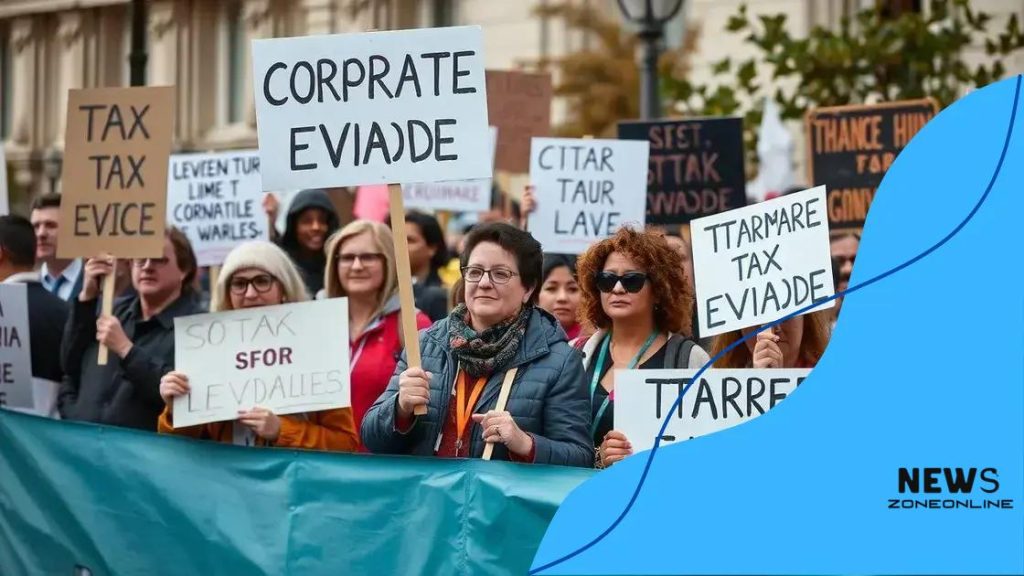Corporate tax boycott campaigns: a growing movement

Corporate tax boycott campaigns mobilize consumers to demand fair tax practices from companies, leveraging media influence and public sentiment to hold corporations accountable for unethical tax behavior.
Corporate tax boycott campaigns are gaining traction as more people question the practices of large corporations. Have you noticed how consumers are becoming increasingly vocal about their expectations? This article explores the dynamics of these boycotts and their influence on businesses.
Understanding corporate tax boycott campaigns
Understanding corporate tax boycott campaigns is crucial in today’s business environment. These campaigns arise when consumers, activists, or organizations challenge corporations over their tax practices. With increasing awareness, people are demanding that companies contribute their fair share.
One factor driving these campaigns is the increasing visibility of tax avoidance strategies. Companies often use loopholes to minimize tax liability, which can lead to public outrage. This is where the rise of social media plays a significant role. Information spreads rapidly, mobilizing communities around a cause.
Key motivations for consumer action
People engage in corporate tax boycott campaigns for various reasons:
- Desire for corporate accountability
- Interest in social justice
- Concern for public services funding
- Environmental and ethical considerations
These motivations reflect a broader awareness of how corporate actions impact society as a whole. As more consumers become educated about tax politics, the likelihood of boycotts increases.
Platforms amplifying the message
The role of various platforms in these campaigns cannot be understated. Social media allows organizations and individuals to coordinate actions effectively. Hashtags and viral content can bring significant attention to a company’s tax practices in a matter of hours.
With campaigns like these, awareness often leads to tangible changes. Public pressure can make companies reassess their policies. This dynamic illustrates that collective consumer action has the power to influence corporate behavior.
Furthermore, when people choose to boycott a company, it sends a clear message about societal expectations. The potential for financial impact encourages businesses to rethink their strategies and align with consumer values.
As we dive deeper into corporate tax boycott campaigns, it becomes apparent that understanding consumer behavior is vital. This awareness can lead to more informed choices and demands placed on corporations.
The motivations behind these campaigns
Understanding the motivations behind corporate tax boycott campaigns is key to grasping their impact. People are increasingly aware of tax practices and the consequences they have on society. These movements often stem from a need for justice and accountability.
Many consumers are frustrated by corporations that exploit loopholes to reduce their tax burden. This evasion can lead to decreased funding for essential public services. As a result, individuals rally together to demand fair contributions from big companies.
Factors driving corporate tax boycotts
Some major factors include:
- Fairness: Consumers expect corporations to pay their share of taxes.
- Social responsibility: There is a growing belief that companies should support the communities they operate in.
- Transparency: Many activists demand clear reporting on how and where companies pay taxes.
- Global inequality: Tax avoidance practices are often seen as contributing to wider economic disparities.
These motivations have been further fueled by social media’s role in amplifying calls for accountability. Activists can spread information quickly, rallying support for their cause and prompting action against companies that fail to engage in responsible tax practices.
Interestingly, public sentiment can shift rapidly. When a company faces backlash, this often leads to a reconsideration of its practices. In many cases, businesses see a direct correlation between public outcry and changes in their tax strategies.
This urgency is evident in cases where boycotts have led to immediate action. The implications of tax avoidance can resonate more widely, prompting a societal push towards change.
Case studies of successful campaigns

Exploring case studies of successful corporate tax boycott campaigns reveals how organized consumer actions can lead to real change. Many companies have faced backlash, resulting in shifts in their policies.
One notable example is the campaign against a major technology firm that was accused of using offshore tax havens. Activists gathered support online and organized protests, which pressured the company to reevaluate its tax strategies. This case illustrates how collective action can influence corporate behavior.
Key examples of impactful campaigns
Several campaigns stand out:
- Starbucks: The company faced criticism for its tax practices in the UK. Public outcry led to changes in its tax reporting.
- Amazon: Activists rallied against Amazon’s tax avoidance, leading to discussions about corporate responsibility and fair contributions.
- Google: Following protests and social media campaigns, Google promised to increase transparency in its tax policies.
- Facebook: The backlash against its tax practices resulted in commitments to pay higher taxes in various regions.
These examples underscore the power of public engagement and the importance of holding corporations accountable for their tax practices. When consumers align their voices, they set the stage for dialogues about fairness and financial responsibility.
Additionally, effective communication strategies play a crucial role in the success of these campaigns. Engaging storytelling and presenting factual evidence often help in rallying support.
As social movements continue to grow, it is clear that successful campaigns not only impact individual companies but also spark larger conversations about corporate ethics and social responsibility.
Consequences for corporations
The consequences for corporations that engage in aggressive tax avoidance strategies can be significant. These consequences can impact a company’s reputation and financial stability. As public awareness grows, consumers are more likely to react strongly against companies they view as not contributing fairly to society.
For instance, a corporation that faces a boycott due to its tax practices might see a drop in sales. This shift in consumer behavior can lead to financial losses and decrease in shareholder confidence. The immediate effects can ripple through various levels of a business.
Long-term implications
In the long run, failure to address public concerns about tax practices can harm a brand. Here are some potential consequences:
- Brand damage: Companies may suffer negative publicity that tarnishes their brand image.
- Legal actions: Aggressive tax avoidance can lead to audits, fines, or penalties from tax authorities.
- Loss of consumer trust: Trust is crucial for customer loyalty; losing this trust can have lasting effects.
- Increased regulation: Ongoing public pressure can lead to tighter regulations on corporate taxation.
These factors indicate that addressing tax practices isn’t just about complying with laws; it’s about maintaining a positive relationship with consumers. The companies recognize that transparency and responsibility in tax contributions are increasingly important to a broad audience.
Furthermore, businesses might start to re-evaluate their corporate social responsibility (CSR) strategies. Stronger commitments to fair tax practices can enhance their public image and overall impact on society, aligning business goals with consumer values.
Public perception and media influence
Public perception and media influence play a pivotal role in shaping the outcomes of corporate tax boycott campaigns. The way these campaigns are portrayed in the media can greatly impact how the public responds and mobilizes.
When the media reports on issues surrounding corporate tax practices, it often brings these concerns to a wider audience. This increased visibility can spark outrage and prompt consumers to take action. For instance, when a high-profile company is highlighted for tax evasion, it can lead to a fast-growing movement among consumers advocating for change.
The role of social media
Social media platforms have transformed how campaigns gain traction:
- Rapid information spread: News and updates about corporate tax practices can go viral in minutes.
- Consumer engagement: Social media allows consumers to share their thoughts and organize protests or boycotts.
- Influencer support: Celebrities and social media influencers can amplify a campaign’s message, reaching even larger audiences.
- Real-time feedback: Companies receive immediate reactions from consumers, allowing them to gauge public sentiment.
As public awareness grows, consumer behavior starts to reflect these values. Companies that are perceived as socially irresponsible may face backlash not just from activists, but also from everyday consumers who feel strongly about fairness and transparency.
Furthermore, public perception can lead to significant financial consequences for businesses. Reports highlighting unethical tax practices can damage reputations, which in turn affects sales. Managing public relations effectively becomes crucial for corporations looking to maintain a positive image.
In this environment, companies are more likely to consider how their tax strategies align with societal values. Being responsive to media critiques can lead to positive changes in corporate policy. Ultimately, the relationship between public perception, media influence, and corporate actions is powerful, shaping the landscape of corporate responsibility.
FAQ – Frequently Asked Questions about Corporate Tax Boycott Campaigns
What are corporate tax boycott campaigns?
Corporate tax boycott campaigns are organized efforts by consumers or activists to protest against companies that engage in unethical tax practices or avoid paying their fair share.
How do media influence these campaigns?
Media coverage can amplify awareness and outrage, helping to mobilize public support and pressure companies to change their tax practices.
What consequences do companies face from these boycotts?
Companies can face reputational damage, loss of consumer trust, and potential financial losses due to decreased sales as a result of boycotts.
What can consumers do to support corporate tax fairness?
Consumers can participate in boycotts, spread awareness on social media, and support companies that demonstrate responsible tax practices.





